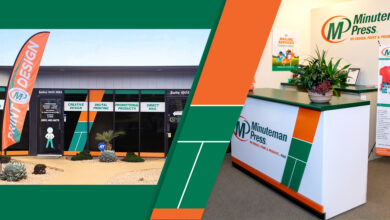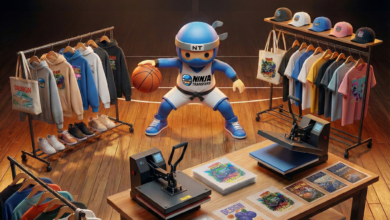Let’s get real about who’s going to love your custom gifts the most. It’s not just anyone with a few bucks to spare. I’ve seen too many small businesses fall into the trap of trying to win over everybody, and guess what? They end up grabbing nobody’s attention. It’s like shouting into a void — frustrating and fruitless. Trying to please everyone is a surefire way to become nothing to no one and fall out of love with what you get to do every day as a custom gift decorator.
Not everyone is going to value what you’re selling, and that’s okay. You want customers who are as excited about your products as you are, not just any wallet that walks through the door or lands on your website or social media page. You have to intentionally seek out a niche to find your ideal customers and their unmet needs. There is a slice of the market out there for you exclusively that will maximize your strengths, align with your values, and bring your ideal customers to you.
One of the major hurdles to going all in on a niche is that we worry we will miss out. We think the jack-of-all-trades type mindset allows for more flexibility and more reach in our potential sales. But the opposite is true. The jack-of-all-trades type mindset only allows those businesses to get the leftover customers who missed their ideal match. These crumbs might give you a little, but ultimately they won’t sustain you, and sooner or later they will find their ideal match, even though it might not be you. You have to become the very best in your space to stand out.
I’ll illustrate with a story that a friend of mine shared on my podcast several years ago. You will see that by being the very best in your space, you will eventually have other people outside of your niche seek you out.
My friend, Brett Bowden of Printed Threads in Fort Worth, Texas, was telling us how he came to do the printing for the Dallas Mavericks professional basketball team. If you ever meet Brett, you will immediately know he is a band guy. If there were a picture in the dictionary next to the term “band guy,” it would be Brett. He has long hair, is slender and cool, and just looks like he should always be holding an instrument.
When he started his company, he didn’t go out and try to go after anyone he could think of. He focused his efforts and his passion of playing in a band and solving the problems that all small bands have. How do small bands get into the “merch” game without having to buy more shirts than their family and groupies could ever use? He figured out how to help them with short-run dark shirts, taking care of the logistics, and, as he puts it, “having rad designs.”
As he slowly developed his business around his ideal customers and their needs, the word spread. Before he knew it, he was doing work for larger and larger bands. And he became known as the band merch guy in the Dallas/Fort Worth area. Soon after, the Dallas Mavericks came calling as they wanted to make some shirts with more of a rock ‘n’ roll feel. They heard he was the guy, and he ended up printing the project for the professional basketball team.
Here is the real secret sauce: In doing that project, they also held to their commitment to great customer service, and after doing such a great job, the Dallas Mavericks kept returning. Still, to this day, if you go to their “about us” page, you will see a bunch of people in black shirts, some long hair, and just really creative types that I’m sure every band wants to work with. And when I recently asked him if they still print for the Mavericks five years later, he said, “Absolutely!”
If you want to follow Brett’s lead, all you need to do is find your unique niche. And in the world of custom gifts, it can feel overwhelming at first. It’s like walking into a crowded room and trying to be heard. But here’s the thing: You don’t need to shout louder. You just need to find the right people to talk to.
Finding your niche is not about what type of work you do or being exclusive, it’s about speaking to and attracting a specific group who gets what you’re about — the ones who’ll rave about what you do because it’s exactly what they’ve been looking for. It’s not about limiting your potential; it’s about refining your focus to create deeper connections and drive more meaningful sales. This is where differentiation is key to the process.
Like many things in business, there is no one-size-fits-all approach to defining your niche. But I can help you narrow things down by sharing five key areas where you can stand out.
1. Target customers: This differentiator is all about narrowing down who your ideal customers are, and you must be specific. Instead of saying you cater to “sports enthusiasts,” why not be the go-to for “youth girls’ indoor volleyball clubs?” And as a reminder, if a professional basketball team walks in and the project is lucrative and fits your business, you still take that order. The specifics are about how you portray yourself to the outside world, not about what business you take in. Who knows, maybe one of the kids on that girls’ volleyball team has a dad who is a professional basketball player. Look up Asjia O’Neal.
2. Killer techniques: This differentiator is about defining your secret sauce. Are you a whiz at wholesale orders and managing fulfillment? Maybe you have the magic touch when it comes to creating heartfelt sublimated memorial plaques. Again, this doesn’t mean you will be making nothing but sublimated memorial plaques, but you will rely on what makes you so good to tell the story of why people should work with you.
3. Tech edge: This differentiator is similar to the techniques, but it might not be specifically about how you do it but more about the resources you have at your disposal to pull it off. For example, you might have systems that make setting up fundraising stores simple for you. If your ability can help a cause earn much-needed resources with minimal fuss, that can be a niche you serve.
4. Super services: This differentiator, like the techniques, is about what sets you apart. But this time it is not how you make it, it’s how you service your customers. This is about playing to your strengths. Are you the neighborhood’s friendly print shop, or do you have a network that opens doors? Maybe your graphic design skills are what set you apart. Pinpoint that service only you can provide. And part of that service might very well be your location in relation to your ideal customers.
5. Branding brilliance: The final differentiator is turning the mirror on you. You or your company might be the draw and your brand is uniquely you. Whether it’s through educational content or a visual style that’s all you, your brand’s personality can be the beacon that draws in your tribe.
The idea is to look at these five categories and connect them to what makes your business unique. It is not about only choosing one differentiator, but it might very well be about blending them to identify a niche that’s distinctly yours. A niche isn’t just “printing for bands.” It’s a brand identity so spot-on that your ideal customers (in Brett’s case, small bands) look to you for your unique talents. Your niche becomes the intersection where your particular set of skills meets an unmet need in the market. Those unmet needs are often hiding in plain sight, waiting for someone ready to roll up their sleeves and get the job done.
Carving out a niche in the custom gift market isn’t about overhauling your entire business model. It’s about fine-tuning and integrating what makes your business unique — your skills, services, technology, and brand. By blending these elements, you create a space that’s uniquely yours, attracting customers who need exactly what you offer.
This clarity will turn customers into raving fans and they will not only want to do more business with you, but they will also lead you to more and more business. Take this opportunity to define your niche and recognize the unmet needs your ideal customers have. This focused approach is about being the go-to expert for your specific audience, building deeper connections, and driving meaningful business growth. GP




